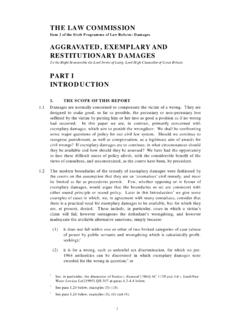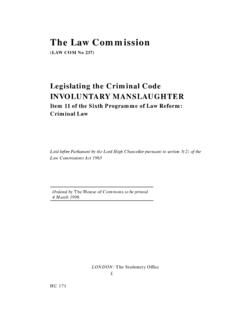Transcription of PRIVITY OF CONTRACT CONTRACTS FOR THE BENEFIT OF …
1 PRIVITY OF CONTRACT . CONTRACTS FOR. THE BENEFIT OF. third PARTIES. LAW COMMISSION. LAW COM No 242. The Law Commission (LAWCOM N o 242). PRIVITY OF CONTRACT : CONTRACTS FOR THE BENEFIT . OF third PARTIES. Item 1 of the Sixth Programme of Law Reform: The Law of CONTRACT .. Presented to Parliament by the Lord High Chancellor by Command of Her Majesty July 1996. LONDON: HMSO. - - Cm 3329. The Law Commission was set up by section 1 of the Law Commissions Act 1965 for the purpose of promoting the reform of the law. The Commissioners are: The Honourable Mrs Justice Arden DBE, Chairman Professor Andrew Burrows Miss Diana Faber Mr Charles Harpum Mr Stephen Silber Q C. The Secretary of the Law Commission is Mr Michael Sayers and its offices are at Conquest House, 37-38 John Street, Theobalds Road, London, W C l N 2BQ.
2 The terms of this report were agreed on 19 June 1996. I.. 11. THE LAW COMMISSION. PRIVITY OF CONTRACT : CONTRACTS FOR THE BENEFIT OF. third PARTIES. CONTENTS. Paragraph Page SECTION A: BACKGROUND. PART I: INTRODUCTION 1. PART 11: THE PRESENT LAW AND CALLS FOR. REFORM. 1. The Present Law 6. (1) A Brief Statement of the third party Rule in CONTRACT 6. (2) Development of the third party Rule 6. (3) Existing Exceptions to, or Circumventions ofJ the third party Rule 9. Trust of the Promise 9. Covenants Concerning Land 10. Tort of Negligence 12. Agency 14. Assignment 15. Collateral CONTRACTS 16. Techniques Used to Enable third Parties to Take the BENEFIT of Exclusion Clauses 16. Promisee's Remedies Assisting the third party 25. (i) Damages 25. (ii) Specific Performance and a Stay of Action 29.
3 Statutory Exceptions 31. (i) Life Insurance 31. (ii) Fire Insurance 31. (iii) Motor Insurance 31. (iv) third Parties' rights Against Insurers 31. (v) Insurance by Those with Limited Interests 32. (vi) Bills of Exchange 32. (vii) Bills of Lading 32. (viii)Law of Property Act 1925, Section 56(1) 33. (ix) Companies Act 1985, Section 14 34. (x) Package Travel, Package Holidays and Package Tours Regulations 1992 34. 2. Calls for Reform 35.. 111. I. Paragraph Page SECTION B: PRELIMINARY ISSUES. PART 111: ARGUMENTS FOR REFORM. 1. The Intentions of the Original Contracting Parties are Thwarted 39. 2. The Injustice to the third party 39. 3. The Person Who Has Suffered the Loss Cannot Sue, While the Person Who Has Suffered No Loss Can Sue 40. 4. Even if the Promisee Can Obtain a Satisfactory Remedy for the third party , the Promisee May Not be Able to, or Wish to, Sue 40.
4 5. The Development of Non-Comprehensive Exceptions 41. 6. Complexity, Artificiality and Uncertainty 41. 7. Widespread Criticism Throughout the Common Law World 41. 8. The Legal Systems of Most Member States of the European Union Allow third Parties to Enforce CONTRACTS 41. 9. The third party Rule Causes Difficulties in Commercial Life 43. (1) Construction CONTRACTS 43. (2) Insurance CONTRACTS 48. 10. Conclusion 50. PART IV PRECEDENTS FOR REFORM. 1. The Law Revision Committee Report 53. 2. Abrogation of third party Rule in Other Common Law Jurisdictions 55. (1) Western Australia 55. (2) Queensland 56. (3) New Zealand 57. (4) United States 60. PART V. THE FORM OF THE LEGISLATION. 1. A Detailed Legislative Scheme? 63. (1) Further Exceptions in Specific Instances 63. (2) Abolishing the Rule Preventing Recovery by the Promisee of third party 's Loss 63.
5 (3) Removal of the Bar to third party Enforcement 64. (4) Reform by Means of a Detailed Legislative Scheme 65. 2. Judicial Development of third party rights 65. 3. Reform of the Promisee's Remedies? 66. PART VI: THE third party RULE AND. CONSIDERATION. 1. Introduction and Consultation 68. 2. Consideration Must Move From the Promisee . 68. 3. The Joint Promisee Exception 70. 4. Reforming PRIVITY Without Reforming Consideration: the Deeper Policy Question 72. iv Paragraph Page SECTION C: CENTRAL REFORM ISSUES. PART VII: THE TEST OF ENFORCEABILITY. 1. Consultation and Our Recommendation 74. 2. The First Limb of the Test of Enforceability 77. 3. The Second Limb of the Test of Enforceability 80. (1) General Aspects of the Second Limb 80. (2) Negligent Will-Drafting 81. (3) The Application of the Second Limb of the Test to Various Hypothetical Situations 85.
6 (4) The Application of the Second Limb of the Test to Some Past Cases 90. 4. The Rejected Tests 92. 5. A Special Test of Enforceability for Consumers? 93. PART VIII: DESIGNATIONyEXISTENCE, AND. ASCERTAINABILITY OF third party . 1. Designation 95. 2. Existence of third party 96. 3. Pre-Incorporation CONTRACTS : A Special Case? 97. 4. Ascertainability of third party and Certainty 100. PART IX: VARIATION AND CANCELLATION. 1. Provisional Proposals and Consultation 101. 2. The Two Extreme Positions 102. (1) Variation or Cancellation at Any Time 102. (2) N o Variation or Cancellation 103. 3. Possible ccCrystallisationyy Tests 104. (1) Awareness 104. (2) Reliance 104. (3) Detrimental Reliance 104. (4) Acceptance 105. (5) Adoption Expressly or by Conduct 105. 4. Choice of Test 105.
7 5. The Reliance Test: Further Details 108. (1) Need the Promisor Be Aware OJ or Forsee, the Reliance? 108. (2) Material Reliance 109. (3) Protection of the third party 's Reliance or Expectation Interest? 109. (4) Burden of Proof 110. (5) Reliance by Someone Other Than the third party 110. 6. Reservation of a Right to Vary or Cancel 111. 7. Can the Relevant Crystallisation Test be Laid Down in the CONTRACT ? 112. 8. Crystallisation Where There Is More Than One third party 112. 9. Creating Irrevocable rights 113. 10. Judicial Discretion to Authorise Variation or Cancellation 113. V. Paragraph Page PART X: DEFENCES, SET-OFFS AND. COUNTERCLAIMS. 1. Introduction 115. 2. Precedents for Reform 116. (1) L a w Revision Committee1 Western AustralialQueensland 116. (2) United States 117.
8 (3) New Zealand 117. 3. Options for Reform 118. 4. Defences,-Set-Offs and Counterclaims Available Only Against the third party 122. 5. third party Enforcing an Exclusion or Limitation Clause 123. 6. The Line Between Benefits and Burdens 124. PART XI: OVERLAPPING CLAIMS. 1. More Than One Plaintiff: Claims by the third party and by the Promisee 128. (1) Promisee's rights 128. (2) Promisee's rights Where Performance by Promisor to third party 128. (3) Promisee's rights Where Release oflsettlement with Promisor by third party 129. (4) Releases Where More Than One third party 130. (5> third party 's rights Where Performance by Promisor to Promisee (Rather than to third party ), or Release oflsettlement with Promisor by Promisee 131. (6) Priority of Action? 131. (7) Avoidance of Double Liability 132.)
9 2. More Than One Defendant: Claims by the third party Against the Promisor, and Against the Promisee on a Pre-Existing Liability 135. PART XII: EXISTING EXCEPTIONS. 1. Preserving Existing Exceptions 138. 2. Should Existing Legislation Conferring rights of Enforceability on third Parties Preclude a third party Taking rights under Our Proposed Legislation? 139. (1) CONTRACTS for the Carriage of Goods by Sea 140. (2) CONTRACTS for the International Carriage of Goods by Road, Rail or A i r 142. (3) CONTRACTS Contained in Bills of Exchange, Promissory Notes and Other Negotiable Instruments 144. 3. Should This Opportunity Be Taken to Reform the third Parties ( rights Against Insurers) Act 1930 and the Married Women's Property Act 1882? 145. (1) third Parties ( rights Against Insurers) A c t 1930 145.
10 (2) Married Women's Property A c t 1882 146. vi Paragraph Page PART XIII: CONSEQUENTIAL AMENDMENTS. 1. Our General Approach 149. 2. The Unfair CONTRACT Terms Act 1977 151. 3. Limitation Act 1980 155. 1. 1. PART XIV. MISCELLANEOUS ISSUES ~. 1. Joinder of Promisee 156. 2. Assignment of the third party 's Right 157. 3. CONTRACTS for the Sale of Land 158. 4. Choice of Law 160. 5. Arbitration Agreements and Jurisdiction Agreements 160. 6. Commencement of the Legislation 163. SECTION D: SUMMARY. PART X V SUMMARY OF RECOMMENDATIO iS 164. Appendix A: Draft CONTRACTS ( rights of third Parties) Bill with Explanatory Notes 173. Appendix B: Legislation From Some Other Jurisdictions 184. Appendix C: List of Persons and Organisations who Commented on Consultation Paper No 121 191. Appendix D: Participants at the Conference on Reform of the Law of PRIVITY of CONTRACT 194.









